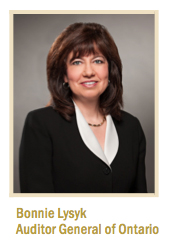 Improvements to services for people with development disabilities are coming too slowly to help those with the greatest need, according to the 2014 annual report of Ontario’s Auditor General, Bonnie Lysyk. The report also focused on the inadequacy of mental health training for parole and probation officers.
Improvements to services for people with development disabilities are coming too slowly to help those with the greatest need, according to the 2014 annual report of Ontario’s Auditor General, Bonnie Lysyk. The report also focused on the inadequacy of mental health training for parole and probation officers.
Residential Services for People with Developmental Disabilities
As Ontarians with developmental disabilities age and live longer, the services available to support them face increasing pressures. These individuals have complex care needs and 40 percent live with a mental health issue. The Ministry of Community and Social Services reports that at the end of March 2014, more than 14,000 Ontario adults with developmental disabilities were still on a wait list for residential services. The Auditor General found that program costs are increasing rapidly, which is perpetuating slow service delivery as well as pressure on these services. Based on these observations, Lysyk made the following key recommendations:
- Ensure that funding for residential services and support for people with developmental disabilities is equitable and tied to the level of support required by individuals in care.
- Review performance measures used in other jurisdictions and adapt these measures to evaluate residential services for people with developmental disabilities in Ontario.
- Ensure that services are administered equitably and consistently so that those in most need receive the services they require.
Mental Health Training for Probation and Parole Officers
In Ontario, the number of offenders with mental health issues has grown by 90 percent over the last 10 years to a total of 10,000 offenders, making up at least 20 percent of the offenders that are supervised each day. The Auditor General reports that many probation and parole officers are not sufficiently trained to oversee clients with mental health issues and do not have appropriate tools to properly assess offenders for mental health issues.
Further, Lysyk states that the Ministry of Community Safety and Correctional Services has not tracked or analyzed reoffend rates by measures of age, gender or mental health issues, which are all available through the Offender Tracking Information System.
Finally, the report suggests that the province lacks a strategy to address the mental health of offenders more broadly and makes the following key recommendations:
- Establish a Ministry-wide strategy that includes training for probation and parole officers to better recognize, supervise and assist offenders with mental health issues.
- Strengthen systems and procedures to ensure probation and parole officers are routinely completing and updating risk and needs assessments and offender management plans.
- Compare and analyze reoffend rates as part of a broader set of publically reported measures to evaluation rehabilitation programs.
The report also covered other issues including immunization, childcare and palliative care. To read the full report, visit the Office of the Auditor General of Ontario’s website.